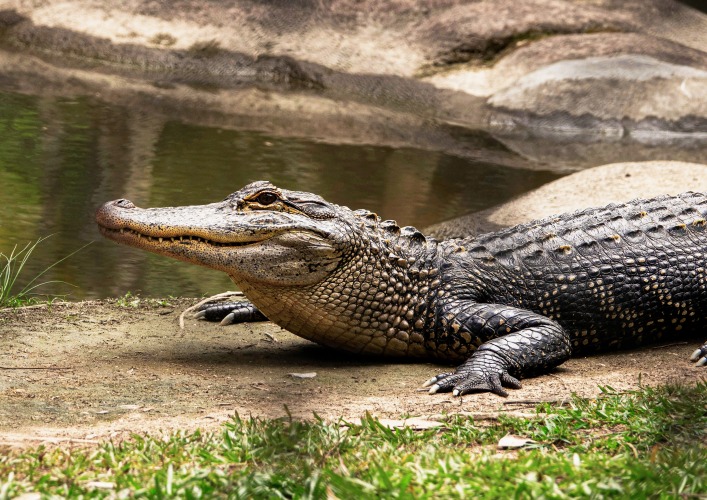In 1992, famed country singer Alan Jackson released one of his top hits about one of the best pastimes; going for a swim.
It wasn’t just any swim, however, it was in the Chattahoochee River.
It’s a common feel-good idea, packing up and heading out to a lake or river.
As fun as it sounds, there’s a dark thought lurking in the back of our minds.
If we don’t say it aloud, at some point, we wonder, “Are there alligators in the water?”
There are millions of alligators in the world and everyone wants to be safe when they’re enjoying a dip.

Contents
So… Are There Alligators in Georgia?
Yes, there are quite a lot of alligators in the state.
Depending on your perspective, it might be good to know that the greater part of the Chattahoochee River is alligator free.
Don’t get too excited, though, as there have been sightings in the southern part.
Oh yeah, there are also about 250,000 alligators in Georgia overall.
Most of the alligators who call the Peach State home live below the fall line.
That invisible line starts on the western border with Columbus, then heads east through Macon, and finally ends up in Augusta.
Everything south of that line is considered the fall line and it just so happens to be the warmest part of Georgia.
It doesn’t mean alligators won’t make their way up toward Atlanta or beyond, it’s just less likely.
If you’re especially nervous about a reptilian encounter, be sure to add the Okefenokee Swamp to your list of places not to visit.
There are as many as 13,000 alligators living in the refuge.
Aside from Okefenokee, there are other comfortable spots that make a great setting for an alligator.
Since you know there are a quarter of a million alligators here, be vigilant even in areas that don’t have a warning.
What you’re going to look for are swamps, lakes, rivers, marshes, and ponds.
Alligator Species in Georgia
There are only a few types of alligators in all of North America.
The most prominent, and the only one found in Georgia, is the American alligator.
They can reach as long as 15 feet and their tails are around half of that.
What makes the American alligator different from its brothers is a broad snout and overlapping upper jaw.
You can tell the age of an alligator by how dark it is.
The darker it is, the younger it is.
A trait that many people wish they had was the ability to regenerate teeth, which is what the alligator does when it loses one of its 75 or so teeth.
The alligator also can swiftly detect any change in the water.
Essentially, they will see you before you see them.
They will also chow down on any moving prey that is nearby.
Is it Safe to Swim in Georgia?
Although you’re probably at your safest when the water is cold, a majority of watering holes in this southern state is safe.
If you’re in an area where alligators have been spotted, there should be bright yellow signs indicating as much.
Try to avoid going anywhere that hasn’t been domesticated.
Simply put, if you’re stepping in a swamp or water with a lot of debris in it, turn around.
Don’t go into uncharted water just to cool off.
The murkier the water, the easier it is for an alligator to build a life there.
Try to swim in well-known places that are taken care of by a local company or the city.

Interesting Alligator Facts in Georgia
Nuisance Gators
There are over 150 alligators that have to be physically removed from an area in Georgia each year.
That can mean one is walking down the street in a neighborhood or he’s hanging out looking through trash at the park.
When coming across a wayward alligator can cause panic.
Luckily, professionals are able to pick them up and return them to a safe space.
Zig Zag Running is Pointless
If you’re from a place with alligators, or you’ve ever watched TV, it’s highly likely you’ve heard the most common tip on how to escape one; run in zig zags.
That is probably a fact that almost everyone knows and yet almost no one has needed to employ.
Hopefully, you never need to, but if you ever find yourself face to face with an angry alligator, do not run like that.
Sadly, it will possibly even hurt your cause.
Running in such a pattern will slow you down and provide traction for the alligator.
What you need to do is run straight and as fast as you can.
These green guys don’t have a lot of endurance.
You should have no problems outrunning one.
Thankfully, the likelihood is infinitesimally small that one will chase you on dry land.
Was this myth perpetuated by an alligator in disguise?
One can never be too sure.
Alligator Attacks
Since the early 80s, there have been nine alligator attacks on humans.
An overwhelming majority of such incidences happen along Georgia’s coast.
Unfortunately, one of those did directly result in the passing of the victim.
The good news is that alligators typically stay away from humans and are extremely unlikely to pursue one, much less attack.
Extinction
In the mid-20th century, alligators came close to being a remnant of the past.
They were killed at such a high level that their numbers were heading towards erasure.
To avoid such a fate, the government stepped in.
After enacting a limit on hunting permits, the population rebounded.
These days, Georgia keeps a close eye on the numbers.
It is assumed, at this point, that humans and alligators have gotten better at getting along.
Helping the Environment
One cool thing about alligators is that they give back.
No person wants to be a meal for the alligator and they probably feel the same.
That’s why they do a great job at helping Georgia avoid having an overabundance of things like snakes, rats, and even insects.
You would be hard-pressed to find someone who wasn’t grateful for that.
In addition, they can improve the habitat during dry seasons.
Alligators are known to dig holes to help attract water.
This is beneficial for the reptiles but also for the flora and fauna around them.
Alligators vs. Crocodiles
In a panic, you might have a hard time figuring out what beast you’re up against.
Perhaps at that point, it doesn’t matter, but it’s still nice to know.
At first glance, alligators and crocodiles look a lot alike.
Both have the capacity to do you some serious damage, but from there, the story gets more interesting.
Color
The most obvious sign of differences starts with appearance.
Alligators are dark forest green.
The youngest alligators are sort of a charcoal color.
Crocodiles tend to be more like camouflage, a mix of lighter and mid-shade greens with brown or beige.
Snout
Alligators have a broad snout that resembles a U, round from side to side.
Crocodiles have pointy snouts that are V-shaped.
You might even be so bold as to say that crocodiles look more menacing due to their exposed teeth from both the top and bottom of the mouth.
Water
If you’re in a lake or river, that’s most likely going to be an alligator taking a vacation day.
If you’re closer to the ocean and see a waddling monster coming toward you, that’s probably going to be a crocodile.
These guys have a gland that shoots out salt, so the saltwater is more their style.
Geography
While alligators prefer warm weather, crocodiles like it hot.
The only crocodiles in the US are found on the tip of Florida.
Even then, you’d have a hard time finding one since they are endangered.
If you’re on the hunt, Central and South America will have more crocodiles.
Behavior
Alligators and crocodiles are intimidating no matter what way you slice it.
However, gators have way more chill than crocs do.
In nature reserves and zoos, caretakers can get close to alligators without fearing for their lives.
This is the opposite for those who care for crocodiles.
3 Safety Tips for Swimming in Alligator-infested Waters
1. Don’t Swim Here
This may sound obvious, but many people ignore the signs.
Places like the Okefenokee do what they can to warn visitors that their presence is not particularly welcome by the wildlife.
The majority of the alligators you’ll find in the state are closer to the southern border or in warm freshwater lakes and rivers.
If you’re new to a location, take the time to research what you’re getting into.
Be sure to look out for and heed the warning signs for alligators when near water.
2. Watch Out for Dependents
It probably goes without saying that adults are a bit more cautious than children and pets.
Your child may even respond in the affirmative when you ask if they heard what you said about looking around an area.
Their excitement about being at the lake may forego their hearing, making it more selective.
Therefore, it would behoove everyone in the group if you did not bring children or pets to places where alligators are known to frequent.
An innocent swim by carefree entities signals sources of protein to predators.
If they do come along, it is imperative that neither gets out of eyesight and stays close to the shore.
3. Get Out Early
Having a peaceful day at the lake can make leaving all the harder.
Don’t let that keep you from getting out well in advance of sunset, though.
In waters that are known to have alligators, the last thing you want to do is overstay your welcome.
As the sun descends lower in the sky, the hunt will be increasingly easier for the alligator.
Don’t let them catch you off guard. Long before shadows act as an aid, go home.
Georgia Safety Overview
READ THE FULL REPORT: Georgia Safety Review
Safety Index:
- OVERALL RISK: LOW
- TRANSPORT & TAXIS RISK: MEDIUM
- PICKPOCKETS RISK: LOW
- NATURAL DISASTERS RISK: MEDIUM
- MUGGING RISK: LOW
- TERRORISM RISK: LOW
- SCAMS RISK: MEDIUM
- WOMEN TRAVELERS RISK: LOW
Frequently Asked Questions
Can alligators smell blood?
Yes.
Alligators have a very strong sense of smell and can pick up blood from a mile away.
Okay, not a mile, but you get what we mean.
If you have any scratches, or bloodied bandages, or are menstruating, please stay away from areas prone to house alligators.
Are alligators tree climbers?
Yes.
It’s bad enough we have to be scared in the water.
Now we have to look up at the trees.
Not only is it a better sight for hunting, but it can also be relaxing to feel the breeze over your scales.
Do alligators live in Lake Lanier?
Years ago, there was a very young alligator found swimming in the lake.
He was about two feet long but was not viewed as a threat.
So, the officials warned the beachgoers to stay clear and let him live his life.
It should be noted that this is rare because it’s above the fall line.











